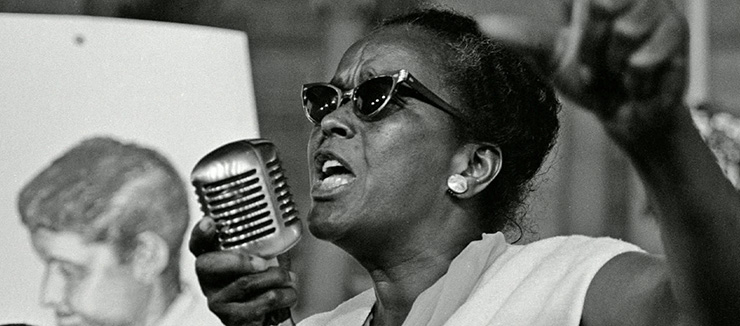
Ella Baker, co-founder of SNCC at Shaw University
Raleigh Civil Rights Movement
Born in Norfolk, raised in Raleigh and graduated valedictorian from Shaw University in 1927, Ella was a maverick who never accepted the white male-dominated status quo. A gifted grass-roots organizer and human rights activist, Ella Baker (1903-1986) emerged to help the energetic, inexperienced students of the Raleigh Civil Rights Movement and across the South.
Ella challenged Shaw University policies that she found to be demeaning. Living in New York City during the Depression Era, she was very active in a number of local political causes. Ella worked as a NAACP field secretary and branch director from 1940-1946 throughout the South. The new branches she opened or strengthened represented infrastructure the Civil Rights Movement would need for gains to come later. Although Ella resigned from the NAACP national staff in 1946 over philosophical differences, she stayed on as the first woman to head the New York branch and led its fight to desegregate New York City public schools.
In 1956, Ella Baker, Bayard Rustin and Stanley Levison established an organization to raise money from the North to support the Civil Rights Movement in the South. In 1957, Ella moved to Atlanta to help organize Dr. Martin Luther King’s newly formed Southern Christian Leadership Council (SCLC) and run a voter registration campaign.
In 1959, she left SCLC over philosophical differences concerning central-driven decisions favored by Dr. King and others vs. local–driven decisions that she favored.
When the locally-ornaized Greensboro student sit-ins began on 1 February 1960, Ella felt a kindred spirit and quickly moved to assist them with organizational skills and access to financial support. Raleigh held its first lunch counter sit-in on 10 February 1960, as the movement read across North Carolina and other Southern states. From Ella’s perspective, funded central-driven SCLC and NAACP approaches could not be as effective as funded students with local-driven approaches.
So she took a job at the Young Women’s Christian Association (YWCA) in Raleigh and invited college sit-in leaders to attend an organizing conference held at Shaw University on 16-17 April 1960. From that conference, the Student Nonviolent Coordinating Committee (SNCC) was born.
SNCC provided the platform for John Lewis and Julian Bond of Georgia, Fannie Lou Hamer of Mississippi, Bob Moses of New York City, Jesse Jackson of North Carolina A&T and Stokely Carmichael of Howard University to emerge as national civil rights activists. Unlike older civil rights groups, SNCC stressed direct tactics initiated by local groups and encouraged women, the young, and the poor to take leadership positions. With such fertile ground to her liking, Ella was very productive in SNCC activities throughout the South. In the 1960s, SNCC Sit-ins and Freedom Rides opened access to public facilities and private enterprises that served the public far more than laws alone could do. Thousands of SNCC activists made the “Colored Only” signs and practices disappear.
